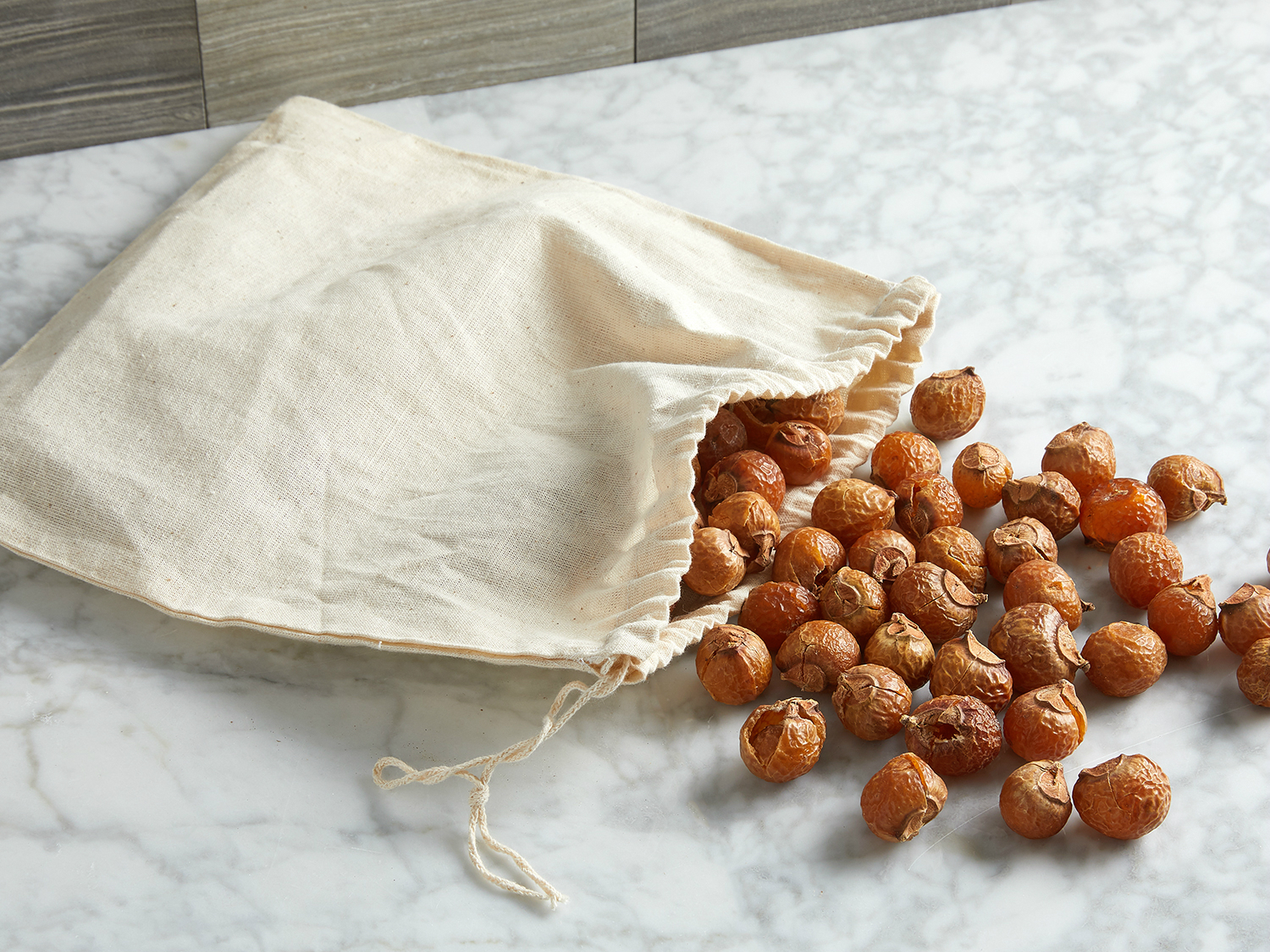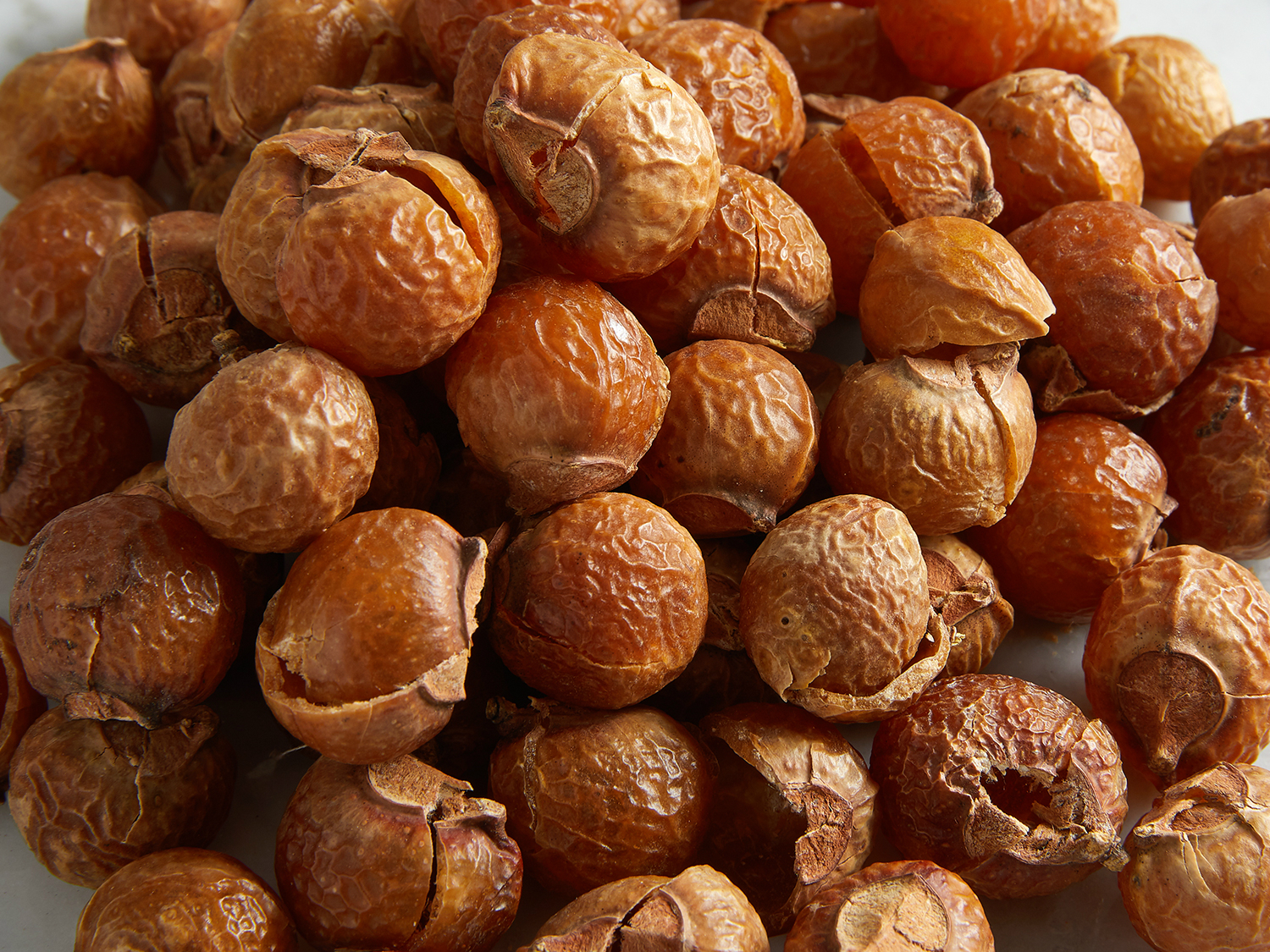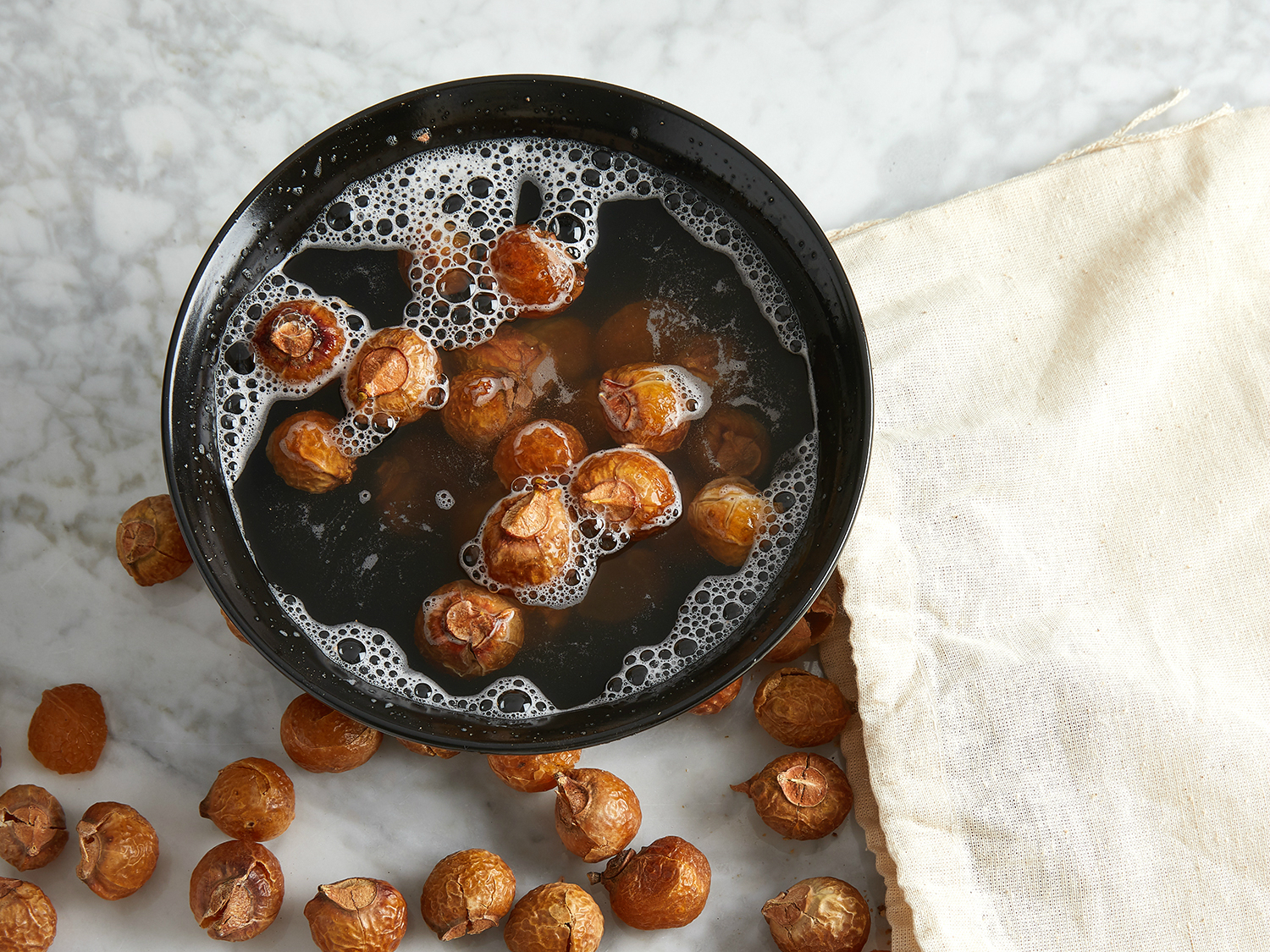Soap nuts aren’t actually nuts at all. They are the husks, or shells, of the fruit harvested from a sapindus mukorossi, a tree native to warm, rainy climates like those found in southern Asia. For hundreds and hundreds of years, people have used soap nuts to keep themselves (and their laundry) clean, with a light freshness that’s free of artificial fragrances.
How It Works
Dunking the soap nuts (or soap berries, as they are also called) in water releases saponin, the natural cleansing agent that exists inside the shells. Saponin is a surfactant, which is basically a fancy word for a substance that reduces the surface tension of a liquid. It acts just like soap, helping dirt, oil, and grease lift away from skin and textiles when it gets wet.
Many prefer to use soap nuts for their cleaning needs. For one, it’s completely natural and biodegradable (it comes from a tree, after all). On a related note, the saponin contained in the soap nuts actually tastes terrible to insects, and they leave the fruit of the tree alone, eliminating the need for pesticide use to keep the trees bug-free. And every bit of lather and bubble you see in water that is mixed with soap nuts is a result of the natural friction of the saponin intermingling with the water. After all, not all bubbles are created equal.

Goodbye, Sulfates
Have you ever wondered why taking a swig of orange juice after brushing your teeth tastes so gross? Blame the bubbles. Sodium lauryl sulfate, an agent present in toothpaste, has an intense interaction with taste receptors in your mouth. While breaking down the phospholipids that act as inhibitors on receptors that detect bitterness, they simultaneously suppress the sweetness receptors. All this action adds up to that disappointing, cringe-inducing feeling we get when we take a gulp of OJ after just having brushed. Sodium lauryl sulfate (or SLS) is a commonly-used cleansing ingredient that serves as a detergent and a surfactant, and not just in toothpaste. Shampoo, shaving cream, and laundry detergent all contain this chemical. And there’s another much more visible effect that rises to the surface as a result of SLS: an overabundance of bubbles.
No Fakes Allowed
When you’re shaving, shampooing, or even washing your car, working up a good lather can be pretty satisfying. From a tactile perspective, the foam feels good, and the sight of all those bubbles can be a psychological trigger that things are really getting clean. But when it comes to getting the dirt out, here’s the bottom line: all of those bubbles are mostly for show.
As we recently reported, products containing charcoal to remove toxins without relying on artificial soap bubbles were wildly popular earlier this summer, and the widening cultural appeal of beards and facial hair grooming has been a boon for the beard oil and tonic industry. But tucked away in the ingredients list of many of those scrubs, cleansers, toothpastes, and shampoos is the ubiquitous SLS, the foaming agent we only think we need, because we’ve been trained over time to equate bubbles with cleanliness.
Soap nuts, in their all-natural tough-on-dirt glory, get the job done without the use of sulfates, chemicals, and fake bubbles.

Fine for Nut Allergies + Sensitive Skin
This simple, chemical-free cleaning method has everything you want, and nothing you don’t need. As we mentioned above, soap nuts aren’t actually nuts, and they do not trigger nut allergies or skin sensitivities. They actually get their name from the wrinkled, textured appearance of their outer shell, similar to a walnut shell or a prune that has dried up in the sun.
Smell You Later
Since soap nuts are harvested directly from a tree, some expect a certain odor to accompany their purchase. The presence of an odor depends largely on the harvesting and shipping practices carried out by the various parties the soap nuts come in contact with on their journey to you.
We ordered several batches of soap nuts from different suppliers to test what worked best. To be honest, the first batch did not smell all that pleasant. There was a heavy sourness detected, like a rotten berry, or a bad, overripe plum that had started to rot. Other batches proved similar, and often the pungent aroma was accompanied by a darker color of the soap nuts themselves. In the end, we went with a supplier that delivered light-colored nuts that were fresh and dry. When we first unwrapped the bag, there was a very slight, cleaner scent that we found to be somewhere between an apricot and an apple. You can’t get around the fact that soap nuts come from trees, but the clearer, lighter-colored husks and lighter scent indicated to us that these soap nuts were stored and shipped right.

Clean and Clear
Using soap nuts for effective, natural, non-toxic cleaning around the home is simple. Cleaning countertops and bathrooms is especially easy with the spray-bottle method. Just add eight cups of water in a pot and throw in about 20 soap nuts. Bring it to a slow, rolling boil, and once the boiling point is reached, cover it up, reduce the heat, and let it simmer for an hour. This action releases the saponin from the soap nuts. When the process is over, the shells themselves will turn gray and mushy, while the water itself will have transformed into a cloudy liquid in a color that could range from a golden yellow to a pale amber. Transfer the liquid into a spray bottle (some choose to add a few drops of their favorite essential oil to the mix at this point) and keep it in the refrigerator between uses so it stays fresh.
Our favorite way to use soap nuts is in the laundry. It’s ridiculously easy. Throw a small handful of them in a muslin bag or pouch and toss it in with the dirty clothes and sheets. When the buzzer on the washing machine sounds, you get a fresh, clean wash with no added chemical fragrances.
But don't just take our word for it. There are a ton of resources out there for soap nuts, and even some reviews. Now that you’ve gained a little knowledge about this incredible, natural cleaning solution, its up to you to decide whether or not to take your laundry game to the next level. But if you ask us, you’d be nuts not to.

